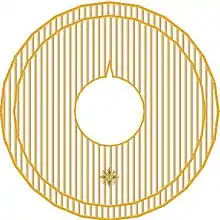fanon
See also: Fanon
English
Pronunciation
- IPA(key): /ˈfænən/
Etymology 1

A papal fanon (seen from above, laying flat).
From Middle English fanon, fanoun, from Old French fanon, from Medieval Latin fanō, from Frankish *fano, from Proto-Germanic *fanô.
Noun
fanon (plural fanons)
Noun
fanon (uncountable)
- (fandom slang) Elements introduced by fans which are not in the official canon of a fictional world but are widely believed to be or treated as if canonical.
- 2018, Kali DeDominicis, “Fitting Him for Leather Trousers: Fanon and the Reclamation of Draco Malfoy and Slytherin House”, in Amanda Firestone; Leisa A. Clark, editor, Harry Potter and Convergence Culture: Essays on Fandom and the Expanding Potterverse, page 97:
- Loyalty is one aspect of Slytherin that canon and fanon readings technically agree on, but fans are significantly more sincere about this characterization.
Derived terms
See also
Further reading
 Papal Fanon on Wikipedia.Wikipedia
Papal Fanon on Wikipedia.Wikipedia  Fanon in fiction on Wikipedia.Wikipedia
Fanon in fiction on Wikipedia.Wikipedia - Fanon article at TV Tropes
References
- OED 2nd edition 1989
French
Etymology
From Middle French fanon, fannon, from Old French fanon, fanum, borrowed from Frankish *fano (“cloth”), from Proto-Germanic *fanô. Cognate with English fane and vane.
Pronunciation
- IPA(key): /fa.nɔ̃/
Noun
fanon m (plural fanons)
- dewlap (pendulous skin under the neck of an ox, lizard, or other animal)
- wattle (wrinkled fold of skin hanging from the neck of a turkey or other bird)
- baleen plate; (in the plural) baleen (bony material that makes up the plates in the mouth of a baleen whale)
- feather, feathering (long hair on the lower legs of a horse)
- (heraldry) bracelet on the right arm
- fanon (vestment reserved for the Pope)
- (usually in the plural) fanon (part of a bishops mitre)
- (by extension, usually in the plural) tabs on a banner or pennant
Derived terms
Further reading
- “fanon”, in Trésor de la langue française informatisé [Digitized Treasury of the French Language], 2012.
Middle English
Etymology
Borrowed from Old French fanon, from Medieval Latin fanō, from Frankish *fano, from Proto-Germanic *fanô. Doublet of fane (“flag, vane”).
Pronunciation
- IPA(key): /faˈnuːn/, /ˈfanun/, /ˈfanən/
Descendants
- English: fanon
References
- “fanǒun, n.”, in MED Online, Ann Arbor, Mich.: University of Michigan, 2007, retrieved 2019-1-3.
Norman
Etymology
(This etymology is missing or incomplete. Please add to it, or discuss it at the Etymology scriptorium.)
Romanian
Declension
Declension of fanon
| singular | plural | |||
|---|---|---|---|---|
| indefinite articulation | definite articulation | indefinite articulation | definite articulation | |
| nominative/accusative | (un) fanon | fanonul | (niște) fanoane | fanoanele |
| genitive/dative | (unui) fanon | fanonului | (unor) fanoane | fanoanelor |
| vocative | fanonule | fanoanelor | ||
References
- fanon in Academia Română, Micul dicționar academic, ediția a II-a, Bucharest: Univers Enciclopedic, 2010. →ISBN
This article is issued from Wiktionary. The text is licensed under Creative Commons - Attribution - Sharealike. Additional terms may apply for the media files.